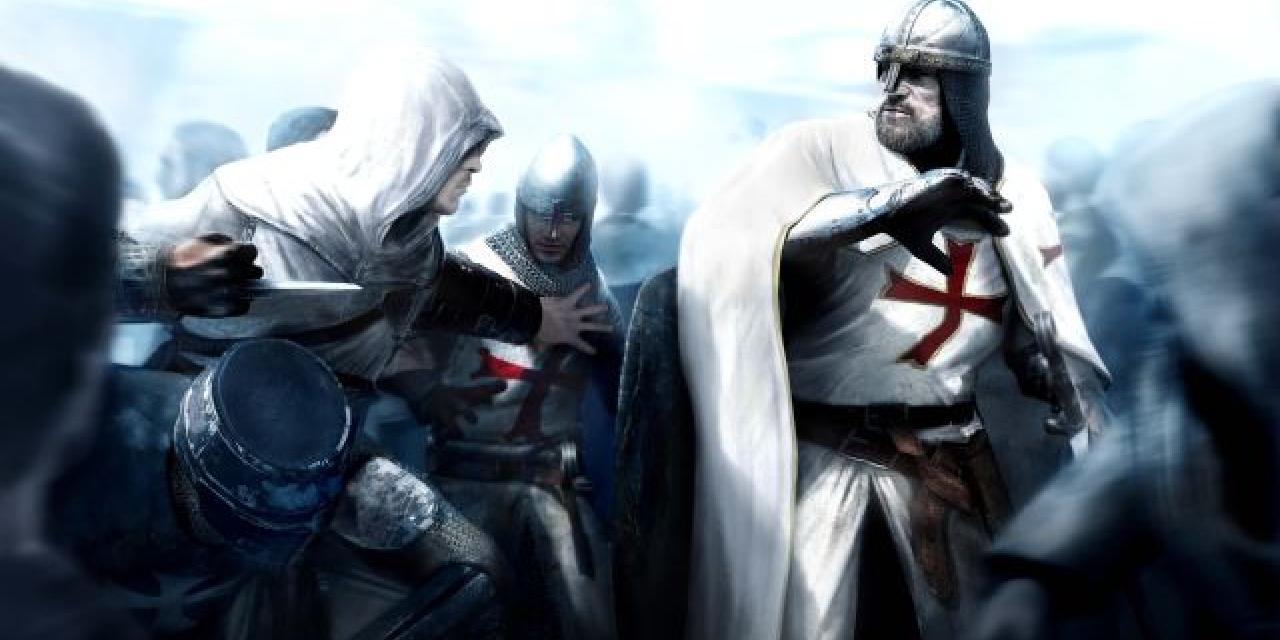

Truer words were never spoken about Assassin's Creed. Ubisoft Montreal's action adventure platformer boasts a free-form world where Assassin Altair can take any path and use any piece of his surroundings to accomplish his objectives. But this ain't Grand Theft Auto: Crusades; innovations in A.I. and gaming engineering have created an all-new gameplay experience with an evolving environment that reacts to the player's actions. And oh-so-much salivating has been done over the in-game graphics and cinematic scenes, with good reason. Assassin's Creed has already won several industry graphics-related awards, long before its release.

Swap A Finger for a Dagger?
Everyone and their mother have seen the E3 official trailer, but for those of you who aren't everyone or a mother, here's a taste of the scenario: High noon in 1191 A.D. Acre (a.k.a. old school Israel). A public hanging is taking place in the city's town square. A white-hooded figure moves through the crowd, gently pushing aside some and shoving others as he makes his way towards the gallows where a knight paces back and forth, shouting to the crowd about what happens when order is disobeyed. All in one instant, the hooded figure hops onto the gallows, grabs the knight by his throat, and plunges his mechanical wrist dagger deep into the knight's face. What follows is a mad dash through a deliciously rendered Third Crusade-age city and an enigmatic ending where the white-hooded figure is protected by a cluster of white-robed monks.
Who cares if it doesn't make sense? It looks ridiculously awesome. And because it's from the same guys who brought us Prince of Persia: Sands of Times, there's no doubt that Assassin's Creed will be of the highest action adventure quality and not just another sandbox game with a weak central plot.
Originally a PlayStation 3 exclusive, Assassin's Creed is coming to PC and Xbox 360 shortly after the PS3 release. The decision to make Assassin's Creed multi-platform has caused a stir in the gaming community, upsetting those who would believe that PlayStation chief Ken Kutaragi cost the PS3 its best shot at a console-selling title by dragging his heels on second-party contracts. Complains have also been lodged against an Xbox 360 version, arguing that Ubisoft would go for a "lowest common denominator" instead of using the PS3's full next-gen capacities.
Nevertheless, as the release date for Assassin's Creed gets pushed back futher and further, fans have been getting more excited about the prospect of a whole new gaming experience that will showcase next-gen consoles in all their updated glory. From ground-breaking technology to an epic sci-fi fantasy storyline, this game looks to have it all and it's nowhere near hitting the shelves yet.
Whether for PS3, PC, or 360, Assassin's Creed is going to do a lot for gaming technology.
The most important thing Assassin's Creed has going for it is the all-new engine designed exclusively for the game. Ubisoft Montreal has been very close-mouthed about the engine, which must be tough because the developers have been working with it from the ground up for nearly three years. In an interview, Assassin's Creed Producer Jade Raymond said the phrase "next-gen" had to be banned at the office to keep the developers focused on creating a quality engine from scratch, rather than trying to manufacture something that would "live up" to the PS3 or Xbox 360. The tactic appears to have paid off as Assassin's Creed demos, previews, and trailers all show a dynamic and moody setting with intricate A.I. interactions.
The programming approach to gameplay and A.I. is an important point of development for the Assassin's Creed team. The gameplay depends heavily on the environment and NPC interactions with Altair as he moves through cities and towns, gathering info, eliminating targets, and fleeing when the guards come after him. Through procedural programming, each and every NPC (and we're talking crowds of them in the hundreds) thinks and behaves uniquely. For those of you who don't program, procedural differs from random appearance approaches (like FaceGen) in that it determines appearance and behavior based on an algorithm that can be reused throughout the game, without ever copying itself. Thus no two NPCs will look alike or react in the exact same way. As Assassin's Creed Lead Engineer Mathieu Mazerolle says, Nothing is canned. Over 10000 animations have been rendered for the NPCs alone (never mind the main character). Thus, this won't be like Superman Returns; Assassin's Creed NPCs can and will react to Altair jumping on rooftops or shoving a peasant, staring, pointing, and even shouting. The crowd also reacts to other NPCs, avoiding bumping into each other as they go about their business (yes, they each have business instead of a random pre-mapped path to follow) and avoiding obstacles.

Vertigo Is Not An Option
As far as A.I. goes, we can't tell you too much about bosses or active NPCs (like the horse seen in the Microsoft X06 demo); but we can tell you more about the ground up programming approach. Mazerolle explained, in a recent interview, that in an effort to make the game as free-form as possible in conjunction with the rock-climbing gameplay, no pre-mapped paths were laid in the levels. Normally, level designers throw down buildings and construct a critical path that determines what a player can and cannot do when progressing through the game. For Assassin's Creed, the designers threw in the buildings and the game detects anything that juts out more than two inches, flagging it as climbable. The A.I. then directs the character on how to move and what animation to display based on which handhold or foothold the player has activated.
All this free-roving sounds great, but it does make some people nervous about physics. Reports of collision issues with the E3 closed demo and the X06 show demo reveal some of the kinks with the new engine and the "new approach." From the early build, it seems that if Altair is too close to a handhold or foothold, his character model will jerk towards it rather than moving naturally against it because instead of his model telling him how to move, the building is telling him how to move. No doubt these tiny things and the falling-through-the-roof bug will be fixed in the final build; Ubisoft has always been committed to quality in its final releases.
The control mapping for Assassin's Creed is pretty nifty and will no doubt lend itself to smooth ports to the Xbox 360 and PC. Instead of predetermined combos, or frantic button-mashing tactics, Altair's body is mapped in sections to each of the PS3's control buttons. Thus, the X button controls all of his leg movements (running, jumping, etc.), the O button handles his arms (pushing NPCs, grabbing handholds, etc.) and when used in conjunction with the R buttons, simple actions such as pushing can become much more violent (think slamming peasantry into walls). The idea behind this control scheme was to make Assassin's Creed as intuitive as possible; thus it's easy to see how O will become B and Triangle will become Y. PC controls might be a bit more difficult; players might consider shelling out for the Xbox 360 controller to use in lieu of W, A, S, and D keys. This isn't an MMO, after all.
Ubisoft games tend to shine in the gameplay department, featuring compelling main characters, fulfilling main plots, and include nifty side features that flesh out the gaming experience as the player traverses the in-game world.
For our main character, we have Altair (Arabic for "the flying eagle") a newly-made member of the Hashashin (root word for Assassin) sect. He's chopped off a finger to swear his life to the cause and has been given a hidden mechanical wrist dagger in order to carry out his assignments. A bit of history here: what makes the original assassins so badass is that they were only permitted the use of a knife when performing an assassination. They couldn't just knock a guy off a cliff and make it look like an accident; the act of killing was meant to be done with skill and finesse, so that the target knew he was being taken out by an assassin. Based on the official trailer, it's safe to say the guy Altair is of this classic stock and Ubisoft has done history justice.

Eye Witness Accounts
The plot details have been guarded by Ubisoft almost as religiously as the new engine mentioned in the technology section. Almost, we say; we know that Altair is given nine men-all real historical figures of the Third Crusade-to take out in order to keep regional stability. We know also that in the X06 demo, a strong sci-fi element was introduced when Altair was killed on a mission. Skip to the next paragraph to avoid potential spoilers. When Altair is attacked, the screen flickers as if a transmission is being tampered with. Much like Gears of War and Ghost Recon, Assassin's Creed goes for realism and thus Altair can only take a couple of hits before dying (come on, those swords were sharp!) In the demo, the distortion got worse and worse until Altair finally died; then the screen went white with choice phrases and words such as animus, access your genetic memory, and memories/01 appearing onscreen. These certainly don't seem like the kind of things you'd see in old Israel, and game voice talent Kristen Bell confirmed sci-fi fans' suspicions in an IGN interview last December: And it's about this science company trying to, Matrix-style, go into peoples brains and find out an ancestor who used to be an assassin, and sort of locate who that person is.
Spoilers end here.
Ubisoft has been touting the social stealth gameplay feature of Assassin's Creed like there's no tomorrow, and with good reason. Gameplay is broken into three parts: information gathering, approach/assassination, and escape. The last part is the most crucial and this is where social stealth comes in. Throughout the game, you have the option to help or hurt NPCs that belong to various groups (beggars, monks, etc.) You have a tolerance meter that lets you know whether or not NPCs are in active pursuit, or inclined to ignore you (Lord, how we could have used this in Oblivion). When fleeing with the tolerance meter at the worst setting (as in they all hate you and want you to die), you can blend in with the crowd, so long as they are amicable to you. Maybe you did the monks a favor before killing that knight; of course you can hide among their ranks and they won't run away from you or point accusingly.
Thus far, we've only seen the bare rudiments of all these features and design innovations. But if the rest of the game looks half as good as the tiny tastes we've been getting, fans should be happy to wait at least another half a year to get their hands on the first "truly" next-gen game. Might have to hold out a bit longer for Xbox 360 and PC, though.

An Assassin Making Friends
Pluses
+Exquisite graphics
+Intriguing game design
+Rich setting and plot
Minuses
-Could have some collision issues with the "free world"
-Not exactly historically accurate (like gamers care, right?)
-Going multi-platform could cause Ubisoft to sacrifice high-end graphics in favor of the lowest common denominator for all systems
Wait and See
+/-No word on exclusive content for the PC, PS3, or 360
